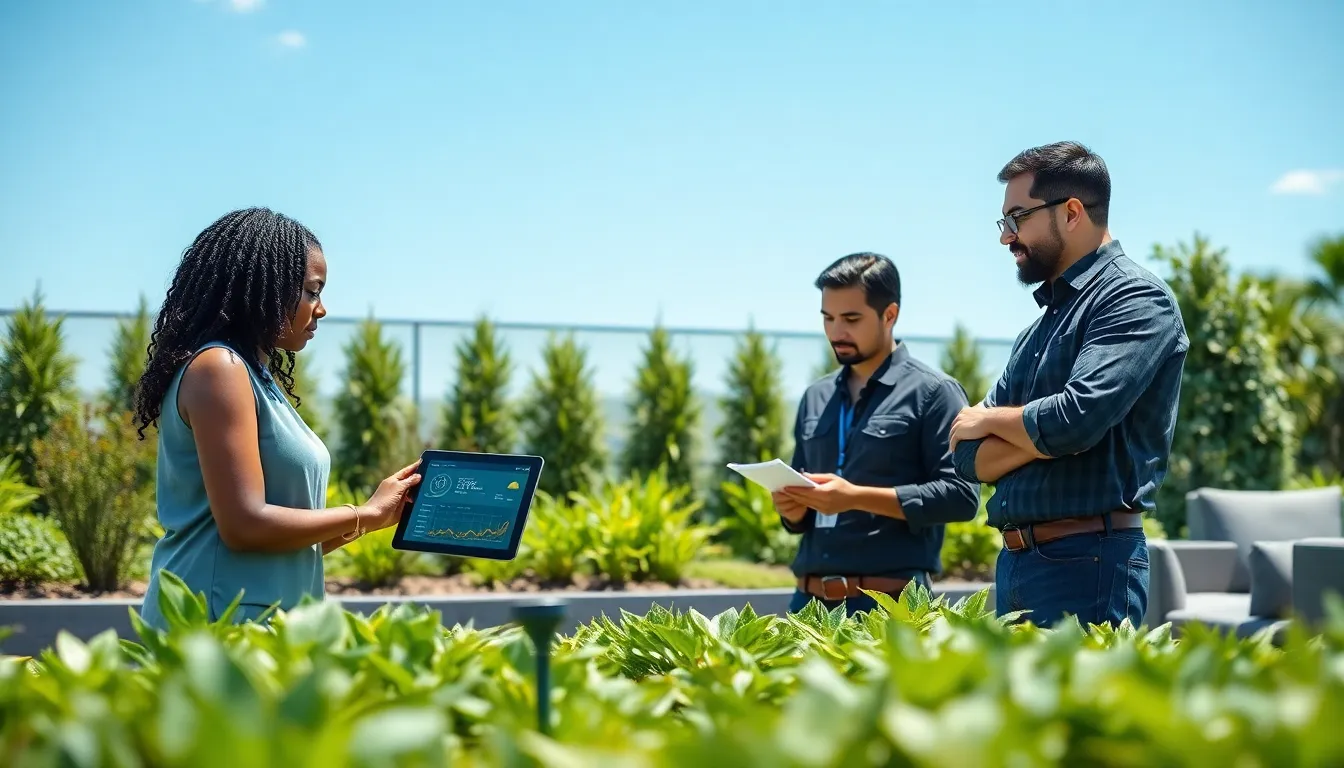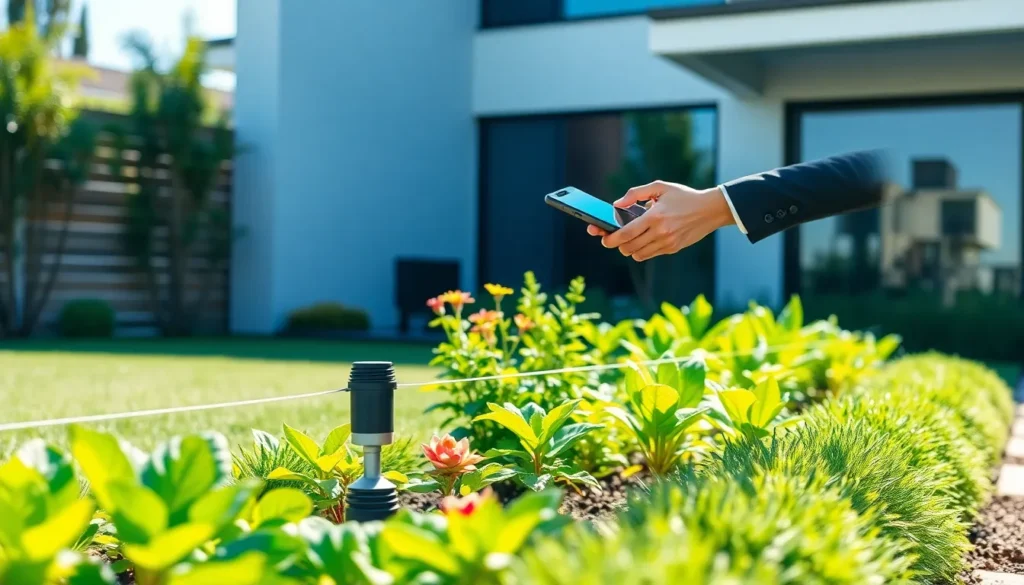In a world where everything seems to be getting smarter, from phones that practically read your mind to refrigerators that order groceries for you, smart irrigation feels like the quirky cousin at a tech family reunion. Imagine a system that not only waters your plants but does so with more strategy than a chess grandmaster. Sounds wild, right? But that’s exactly what smart irrigation technology offers. In this guide, we’ll jump into the nitty-gritty of how these systems work, their benefits, and why they’re not just a passing trend, but crucial for every modern homeowner. Buckle up, because we’re about to explore the future of watering.
Table of Contents
ToggleUnderstanding Smart Irrigation Technology

Smart irrigation technology represents a leap forward in the way landscapes are cared for. Imagine, if you will, a setup so advanced that it takes into account the ever-changing weather patterns, soil moisture levels, and even the unique water needs of different plants. This technology often uses smart sensors and IoT (Internet of Things) connectivity to optimize water use. Rather than relying solely on timers, these systems can adjust watering schedules in real-time. For example, if rain is in the forecast, a smart irrigation system can delay watering, saving both water and your precious plants from drowning. This technology marries efficiency with environmental consciousness, making it a cornerstone of modern landscape management.
Benefits of Smart Irrigation Systems
The benefits of smart irrigation systems extend beyond just conserving water: they also promote healthier plants and reduce utility costs. To put it simply, well-watered plants are happy plants. Here’s a closer look at some benefits:
- Water Conservation: Smart systems can reduce water usage by up to 50%, a staggering figure in today’s climate-conscious world.
- Cost Savings: With less water wasted, homeowners can see significant reductions in their water bills. Given that the average household spends over $500 on water annually, that’s no small change.
- Improved Plant Health: Targeted watering promotes stronger root growth and healthier plants. No more guessing how much your flower beds or vegetable gardens need.
- Convenience: Imagine running your irrigation system from your smartphone. You can program schedules, get alerts, and even control everything while you’re lounging on a beach miles away, sounds delightful, doesn’t it?
- Eco-Friendly: By minimizing water waste, these systems contribute to overall sustainability. In a time when everyone is looking to reduce their carbon footprint, smart irrigation steps up.
Innovative Features of Smart Irrigation Solutions
Smart irrigation isn’t just about turning the water on and off. It incorporates a host of innovative features that make it a standout choice:
- Weather Forecast Integration: Advanced systems connect to local weather stations to forecast rainfall. If rain is predicted, the system can skip a scheduled watering.
- Soil Moisture Sensors: These sensors monitor the moisture levels in the soil, ensuring that plants receive just the right amount of water, not too much, not too little.
- Plant-Specific Scheduling: Different plants have different needs, and smart irrigation systems can adjust schedules accordingly, ensuring optimal health for each type of vegetation.
- Remote Management: Control your irrigation system from anywhere via an app. Whether you’re in a different state or just in your office, you can adjust settings on the fly.
- Data Analytics: Some advanced systems offer analytics features that track water usage, plant health, and even provide tips tailored to your landscape.
Integrating Smart Irrigation with Real Estate
The real estate industry is starting to embrace smart irrigation technology for various reasons. Eco-friendly homes with smart features appeal to modern buyers, who prioritize sustainability and efficiency. Integrating these systems into new developments can increase property value and market appeal.
- Sustainability: Buyers are more conscious than ever about environmental impacts. Homes equipped with smart irrigation systems not only demonstrate a commitment to sustainability but also provide long-term cost benefits.
- Greater Property Value: By adding smart irrigation to new construction, developers can offer potential buyers added features that justify a higher price point.
- Marketing Point: Real estate agents can market smart system features prominently, attracting tech-savvy buyers who appreciate modern conveniences.
Challenges and Considerations in Implementation
While smart irrigation systems offer fantastic benefits, implementing them comes with its own set of challenges. It’s important to consider these factors:
- Initial Costs: The upfront investment for a smart irrigation system can be higher than traditional setups. Weighing these costs against long-term savings is essential.
- Complexity of Setup: Depending on the scale, installation can require professional help. Not everyone has the time or expertise to set these up effectively.
- Maintenance Needs: Ongoing maintenance, such as calibrating sensors and monitoring software, is necessary to keep systems running smoothly. Neglect can lead to decreased efficiency.
- Technology Reliability: Like any tech, smart irrigation systems can fail or require updates. Homeowners should stay informed about their systems to avoid potential disruptions.
Future Trends in Smart Irrigation
The future of smart irrigation is bright, with exciting trends on the horizon. As technology continues to evolve, homeowners can expect:
- AI Integration: Artificial intelligence will play a significant role in smart irrigation, allowing systems to learn from user habits, weather patterns, and plant health to optimize watering automatically.
- Integration with Smart Home Systems: Future irrigation solutions will likely be able to integrate seamlessly with other smart home devices, creating a cohesive smart living environment.
- Enhanced Data Analytics: Advanced analytics will provide deeper insights into water usage and plant health, enabling better decision-making for homeowners.
- Greater Accessibility: As technology advances, smart irrigation systems will become more affordable and accessible to the general public, breaking the barrier for widespread use.






